
This year, the Democratic National Convention held its first-ever panel on Palestinian human rights. The panel came after persistent grassroots organizing against U.S. support for Israel’s assault on Gaza. We play excerpts, including from the Arab American Institute’s James Zogby, a former executive member of the Democratic National Committee; Dr. Tanya Haj-Hassan, a pediatric intensive care surgeon who recently worked in Gaza; and Layla Elabed, co-chair of the Uncommitted National Movement.
Later that day, during President Biden’s convention speech, protesters standing near the Florida delegation unfolded a banner proclaiming “Stop Arming Israel.” Democracy Now was at the scene. We speak with one of the protesting delegates, Liano Sharon, an elected DNC delegate from Michigan, as he was escorted off the convention floor. Sharon, who is Jewish, told Democracy Now! that he participated in the action because “'never again' means never again for anyone, anywhere, ever, period.”
Transcript
AMY GOODMAN: This is Democracy Now!, democracynow.org, “War, Peace and the Presidency: Breaking with Convention.” I’m Amy Goodman, here in Chicago with Juan González.
JUAN GONZÁLEZ: Well, the opening day of the Democratic convention on Monday featured the first-ever panel on Palestinian human rights at the DNC. The panel was announced just a day earlier and came after persistent grassroots organizing against U.S. support for Israel’s assault on Gaza.
AMY GOODMAN: The panel was moderated by Minnesota Attorney General Keith Ellison and featured former Michigan Congressmember Andy Levin; Hala Hijazi, a Democratic organizer and fundraiser who’s had over 100 family members killed in Gaza; Dr. Tanya Haj-Hassan, a pediatric intensive care surgeon who served in Gaza many times; Layla Elabed, the co-chair of the “uncommitted” movement; and James Zogby, a former longtime executive member of the Democratic National Committee and the founder of the Arab American Institute. Zogby began by speaking about the significance of the first-ever panel on Palestinian rights being held at the DNC.
JAMES ZOGBY: I have been doing this for most of my life, like 50 years. And I remember when we couldn’t get the issue of Palestine discussed at the Coalition for a New Foreign and Military Policy, that was all the left groups, because they said, “If you let the Arabs in, we’ll lose our credibility.” And when the anniversary of Dr. King’s march happened, again, we were invited to be on the steering committee, and they said, “Eh, if you let the Arabs in, it’ll hurt our credibility.” And so we were asked to leave.
Jesse Jackson made all the difference in the world, because he elevated the issue, and he elevated those of us who raised the issue. And the last two times — the only two times — that the word “Palestine” was mentioned at a Democratic convention was 1984 and 1988 with Jesse Jackson, when — when he spoke in his speech about it, and he invited me first to give him a nominating speech, where I talked about justice for Palestinians. And then, in ’88, we had a platform fight, an actual platform debate from the podium of the convention, on justice for Palestinians.
So, we’ve come a long way. People say to me, “Well, you’re just being optimistic. You’re just saying, you know, 'Cup is half full.'” I say, “No, I remember when we didn’t have a cup.” And we are now with a cup and filling it up. So, when I look at this panel today, it is not the prize. The prize is a change in policy. That’s the prize. …
But what’s historic here is that we are having an officially sanctioned panel to talk about it. Like I said, it’s not the main prize. It’s not the big prize. But it is something I do not want to dismiss for a minute as to how significant this is, about what message the Harris campaign is sending by saying, “We want to talk about this and hear you talk about it.”
And so, I’ve heard some grumbling, you know? I quote Willie Barrow, a friend of mine from the Jackson campaign in the '80s, who said, “We ain't never been here before.” She’d say, “We ain’t never been here.” We’ve never had this forum before. And it is not, like I said, the end. It’s the beginning of a process.
And the difference is — and I told this to Layla and Abbas last night — that when we raised it in '84 and ’88, we did so because Jesse Jackson enabled us. It was a top down. There were people in our Jackson coalition who were, “Reverend, you sure you want to do this? Are you sure you want to talk about this?” He said, “Damn it, I'm doing it. I’ve been doing it from the beginning. We’re not backing away.” This is different. No candidate elevated this movement. This was a bottom up. This was Abbas. This was Layla. This was Waleed. This was activists across the country who said, “We’re not taking it.”
And part of recognition of that is that we’re having a forum, a recognized one. I’ve been to a lot of the forums since this day has begun. You know, I’ve been to a number of these sessions. This is the largest audience I’ve seen for any one of them. Right?
JUAN GONZÁLEZ: That was James Zogby, the former longtime executive member of the Democratic National Committee and the founder of the Arab American Institute. One of the most emotional parts of the panel came during comments by Dr. Tanya Haj-Hassan, a pediatric intensive care surgeon who has been to Gaza several times over the past 10 months with the aid group Doctors Without Borders and other groups. She spoke about some of what she witnessed in Gaza.
DR. TANYA HAJ-HASSAN: For the past 10 months, we have witnessed civilian massacre after civilian massacre — school massacres where internally displaced people were sheltering, the flour massacre, massacres of people trying to collect water, massacres of people collecting aid at aid sites — massacre after civilian massacre, entire families exterminated in one single bomb; humanitarians, healthcare workers killed and journalists killed at record — in record numbers; pediatric amputations, amputations in children that are breaking records; over 17,000 children who have lost one or both parents since October in Gaza.
We have treated so many children who have lost their entire family that it has — a term has been coined to describe these children — you’ve probably heard it — “wounded child, no surviving family,” WCNSF. This is a term that has been coined since October to describe this very frequent phenomenon that I personally witnessed more times than I can count while I was there. For children — I have held the hand of children who are taking their last gasps, because their entire family was killed in the same attack and couldn’t be there holding their hand and comforting them, and could not bury them thereafter.
For the children who I treated who were discharged, they were — and survived, they face a Russian roulette of a hundred ways that they will likely and potentially die when they leave the hospital due to the circumstances incompatible with life that have been architectured by this military assault: direct bombing, starvation, dehydration, disease, alarming reports of the first cases of polio in Gaza right now. Polio is a potentially deadly disease that causes paralysis, including paralysis of the muscles needed to breathe. That has been eradicated for decades in that region. There has been a polio vaccination campaign that essentially has eradicated the disease from the majority of the world. And now we’re seeing cases emerging in a area of the world that cannot — that has a healthcare system that has been completely and entirely annihilated.
I mentioned these wounded children with no surviving family. I’m going to give you two quick stories, just so that you can humanize what I mean when I say this, because I know it’s really hard to hear these numbers and think about individuals and what this means to them.
I received a young boy into the emergency department during one of the mass casualties who had half of his face and neck blown off. Luckily, the organs that are vital for breathing and blood supply to the brain were preserved. They were visible, but preserved. And he was talking to us. He couldn’t see himself, so he didn’t know what he looked like at that point in time, and he kept asking for his sister. His sister was in the bed next to him. The majority of her body was burned beyond recognition. He didn’t recognize that the girl in the bed next to him was his sister. His entire family, parents and the rest of his siblings, were killed in the same attack.
That boy survived. And the next day, I went to see him. A very young plastic surgeon, one of the few remaining plastic surgeons in Gaza, because the others have either been killed or have fled, understandably, had removed part of his chest and created a graft to cover those vital organs of the neck. He was lying in his bed and mumbling, because it was so difficult to talk. And he kept saying — I got really close to him, and he said, “I wish I had died, too.” And I said, “What?” And he said, “I think my entire family has gone to heaven” — or, it’s not “my entire family.” His exact words were something to the effect of, “Everybody I love is now in heaven. I don’t want to be here anymore.” That is one of so many stories. I’m giving you — I’m so sorry, Layla, but I think people need to hear this. I’m giving you the story of one child.
One of my healthcare worker colleagues, a young nurse, one of the most dedicated nurses I’ve ever met, was trying to evacuate a patient when Al-Shifa Hospital was bombed, from north to south. He carried that patient, was eventually called by Israeli forces, not by name, but by uniform: “You, the person in scrubs, come here.” He was subsequently detained for 53 days. He reported physical, sexual and psychological torture while in detention, and ultimately released because he had no crime.
After he was released, he worked constantly, because, one, he was so dedicated, and, two, he suffered from severe insomnia from the trauma of his detention. He was always in the resuscitation room of the emergency department, cleaning out sand from the eyes of people pulled from under the rubble, trying to comfort them. One day, overnight, he fell asleep holding the body of a dead child still with a breathing tube in after they had failed to resuscitate the infant.
Another day, I asked him to go home, because he hadn’t slept in so many hours. So he left the hospital. Couple hours later, I see him in the emergency department trying to resuscitate a man whose arms and leg — sorry, whose both legs and one arm had been blown off. I asked him what he was doing in the hospital. “I thought you went home to rest.” And he said, “This is my sister’s husband. They woke me up to tell me that the aid distribution site had been bombed, and my sister’s husband had gone there. So I went to find him, and found him severely injured.” So I helped him resuscitate this patient. His home has been destroyed. He’s a young man. He’s engaged. He’s trying to get married. He had a whole life ahead of him, and he was a very dedicated healthcare worker.
I’m giving you two stories, a child and a healthcare worker, but these are representative of literally almost everybody I know in Gaza. I don’t know a single healthcare worker who has not lost multiple members of their family.
So, as the U.S. continues to fund this military campaign unconditionally, and somewhat blindly, in stark contrast to documented realities on the ground, in stark contrast to the findings of the International Court of Justice of plausible genocide, and in stark contrast to the universal, global condemnation of humanitarian and human rights organizations, we have no choice but to exert as much pressure as possible and use all the leverage we can to change direction, the direction that this country is taking.
AMY GOODMAN: That was Dr. Tanya Haj-Hassan, a pediatric intensive care surgeon who’s volunteered in Gaza hospitals a number of times. Layla Elabed, the co-chair of the Uncommitted National Movement, who was seated right next to her, was overcome with emotion and briefly walked out during Haj-Hassan’s comments. Layla Elabed later responded to a question about the plans for the uncommitted movement between now and November.
LAYLA ELABED: We stand at a very crucial moment for our party. The Democratic Party, the party of my father, the party that has stood up for justice, is being tested. Will it rise for the occasion and stand for the values that it was built on — freedom, equality, justice — or will it remain silent in the face of unimaginable suffering? If we remain silent, and we become complicit. But if we stand up and demand action, an arms embargo, a ceasefire, an end to war, we may have an opportunity to restore the soul of the Democratic Party and unite us under a big tent.
The Listen to Michigan and the Uncommitted National Movement is in the fight for the soul of the Democratic Party. I want to quote Fannie Lou Hamer, who wasn’t allowed to speak from the stage at the 1964 Democratic National Convention because of her identity: “I question America. Is this America, the land of the free and the home of the brave?” All we are doing right now is in the tradition of Fannie Lou Hamer and the Mississippi Freedom Party and the civil rights movement of the 1964 Democratic Party convention: bringing moral witness to the most powerful political party in the world to listen to voices deeply impacted by our U.S. policy decisions.
We aren’t that different from any other movement, from unions, civil rights, gay marriage, reproductive rights or climate justice. We are fighting to be recognized, to be part of this party. And we are fighting for this party to believe in our equal rights. Hala and I shouldn’t have to stand up here and tell you the suffering of our family members for Democrats and for this administration and for Vice President Harris to want to do the moral and right thing to do.
AMY GOODMAN: Layla Elabed is co-chair of the uncommitted movement, speaking at the first-ever panel on Palestinian human rights here at the DNC. This is Democracy Now!, democracynow.org, “War, Peace and the Presidency: Breaking with Convention.” I’m Amy Goodman, with Juan González.
JUAN GONZÁLEZ: On Monday night, President Biden headlined the opening night of the Democratic National Convention. Biden’s speech came less than a month after he announced he ended his reelection campaign, paving the way for Vice President Kamala Harris’s nomination. On Monday night, Biden briefly spoke about Israel’s war on Gaza.
PRESIDENT JOE BIDEN: We’re working around the clock, my secretary of state, to prevent a wider war and reunite hostages with their families and surge humanitarian health and food assistance into Gaza now, to end the civilian suffering of the Palestinian people and finally, finally, finally deliver a ceasefire and end this war. … Those protesters out in the street, they have a point. A lot of innocent people are being killed, on both sides.
AMY GOODMAN: A few minutes into President Biden’s remarks, three delegates, part of Delegates Against Genocide, dropped a banner that read “Stop Arming Israel.” We were inside the convention floor right next to the Florida delegation, where it happened. While some delegates snatched the banner away, many others of the Florida delegation quickly raised Joe Biden placards that said “Thank you, Joe” and “We love Joe” to block any view of the banner. The protesting delegates who dropped the banner were quickly escorted from the convention floor by security. We’re going to go to that moment inside the convention on opening night.
BIDEN SUPPORTERS: Thank you, Joe! Thank you, Joe! Thank you, Joe!
PRESIDENT JOE BIDEN: I wasn’t looking in the past. I was looking in the future.
DELEGATE: We have a right. We have a right. We have a right.
BIDEN SUPPORTERS: We love Joe! We love Joe! We love Joe!
BIDEN SUPPORTER 1: Get him out. He’s threatening her. He’s threatening her. Get him out.
AMY GOODMAN: Sir? Sir? Sir?
BIDEN SUPPORTER 2: Ma’am, we’re trying to listen to the president.
AMY GOODMAN: What are you doing?
BIDEN SUPPORTER 2: We’re trying to listen to the president. Sir, you are committing assault.
LIANO SHARON: I’m trying to protest.
BIDEN SUPPORTER 3: We’re trying to listen to the president.
LIANO SHARON: I’m trying to protest the murder of children in Gaza. I’m trying to protest. [inaudible] This is the only way [inaudible] America is through protest.
AMY GOODMAN: What’s your name, sir? Sir, what’s your name?
LIANO SHARON: My name’s Liano Sharon. I’m a DNC delegate from Michigan.
SECURITY GUARD: Can we wait 'til you're downstairs?
AMY GOODMAN: And what did you do today?
LIANO SHARON: Today, we held up a sign protesting the murder of children in Gaza and the continuing genocide.
SECURITY GUARD: Watch your step. Watch your step.
REPORTER: What did the sign say?
LIANO SHARON: It said “Stop Arming Israel.”
SECURITY GUARD: All right, thank you. Let’s keep it going. [inaudible]
REPORTER: What was your name, sir?
LIANO SHARON: Liano Sharon.
AMY GOODMAN: And what happened then?
SECURITY GUARD: Let’s get into the tunnel. You can interview him in the tunnel. OK?
AMY GOODMAN: And what happened next?
SECURITY GUARD: I just don’t want you to break your ankles.
LIANO SHARON: Then the people behind us grabbed a hold of the sign and tried to rip it out of our hands several times. Eventually, they succeeded.
SECURITY GUARD: Interview in the hall, OK? Let’s get him down. All right, thanks for being cooperative, sir.
LIANO SHARON: Yeah, no problem.
SECURITY GUARD: OK. Thank you.
AMY GOODMAN: And why did — and why did you do it?
LIANO SHARON: I did that because we are currently funding a genocide.
BIDEN SUPPORTER 4: Thank you, Joe! Thank you, Joe! Thank you, Joe!
LIANO SHARON: And we need to — and it needs to stop. And also, I want to — I want to make it clear to the Harris campaign that this is actually in their interest. Netanyahu is trying to instigate a larger war so he can remain in power and avoid going to prison. In order to move Netanyahu off of his current position of trying to expand the war in order to stay in power and remain out of jail, we believe that the U.S. needs to stop arming Israel, needs to have an embargo against their — against their genocide. Otherwise, Netanyahu doesn’t have the incentive to stop the genocide, to stop the mass murder.
AMY GOODMAN: Why does this matter to you so much?
LIANO SHARON: It matters to me so much because I’m a Jew and I was always brought up to believe that “never again” means never again for anyone, anywhere, ever, period. And that’s not what’s happening right now. What’s happening right now is that we are continuing to fund and support an ongoing genocide, the mass murder of children. And it needs to stop.
AMY GOODMAN: Voices from inside the Democratic National Convention Monday night during President Biden’s remarks. Special thanks to Sam Alcoff, Hany Massoud and Nermeen Shaikh. It was when three of the delegates, part of a group called Delegates Against Genocide, dropped a banner that read “Stop Arming Israel.” We’ll speak with all three delegates in our other hour of “War, Peace and the Presidency: Breaking with Convention.” Stay tuned.
When we come back, we look at the life and legacy of pioneering TV host Phil Donahue. Stay with us.

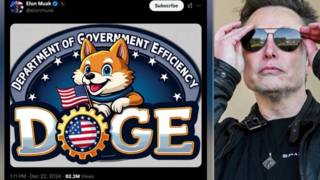
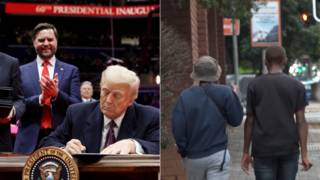
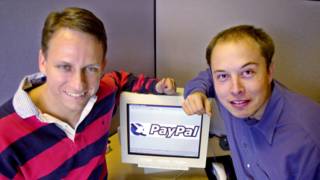
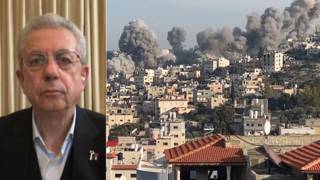
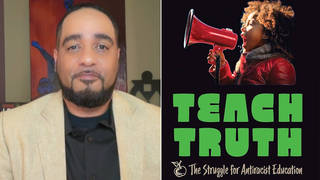




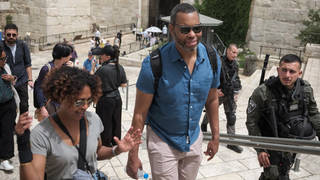
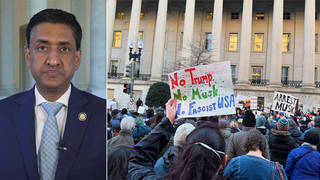
Media Options